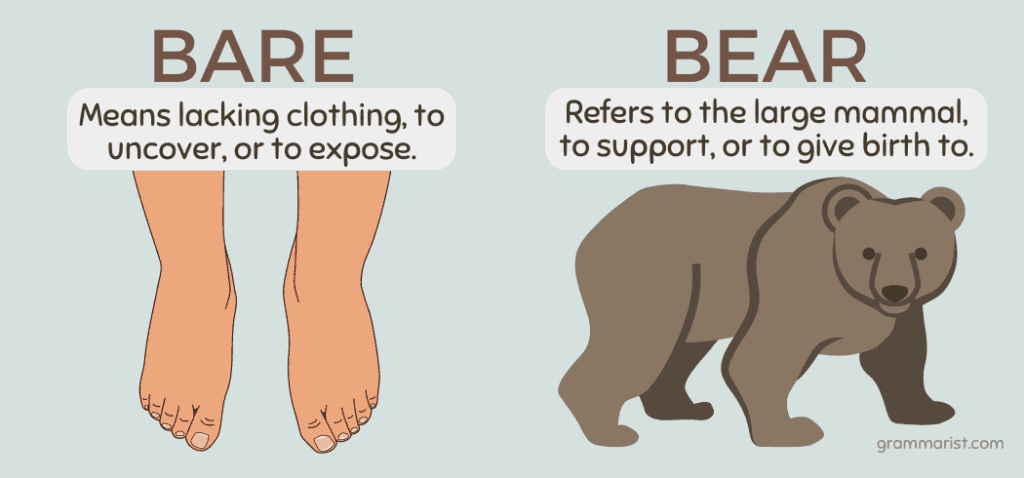Homophones are words that sound the same but have different meanings. This can be confusing for anyone learning English, as well as native speakers, since we depend so much on speech for communication.
I find that simple explanations of spelling variances can do wonders to help English language learners understand the differences between these types of words.
Let’s take a look at two commonly confused words: bare and bear. Despite their exact pronunciations, they mean very different things.
Difference Between Bare and Bear

Both words can be used in different parts of speech.
As an adjective, bare means lacking clothing, naked, exposed to view, or lacking adornment. As a verb, it means to make bare, to uncover, or to expose. Its past tense is bared.
The definition of bear as a noun refers to the large mammal that bears its name. As a verb, it has a variety of meanings, such as to hold, to support, to exhibit, to carry oneself in a specified way, to endure, to give birth to, and to yield (especially fruit). Its past tense is bore (e.g., it bore fruit), and its past participle is borne (e.g., it has borne fruit).
How to Use Bare
Bare can be used as either an adjective or as a verb.
As an Adjective
Bare, as an adjective, means without covering, inferring the nakedness of an object or area. In this use, it can also serve to explain something that is mere, plain, and unadorned.
For example:
- When I sold my couch, I was surprised at how large and bare the family room looked with it gone.
- Her bare shoulders were sunburnt after a day on the beach.
- The bare minimum I would accept is $150.
As a Verb
Bare also serves as a verb to describe something you uncover, unconcealed, or undisguised. This can be used in both literal and figurative meanings.
For example:
- Please bare your head when the National Anthem is sung.
- She bared her soul to her friend when asking for forgiveness.
- She watched the dog bare his teeth at the stranger, warning him to back away.
How to Use Bear
Bear can be used as a noun or verb.
As a Noun
The first thing many people think of when they hear the word “bear” is the large, hairy mammal native to almost all of Earth’s continents. As a noun, the word is often used in a figurative sense to provide a comparison to a person or a person’s behavior that may be difficult to deal with.
For example:
- If he wasn’t such a bear in the morning, I would have invited him to breakfast.
- Molly was a momma bear when it came to protecting her kids from bullies.
As a noun, it also can function as an adjective to modify another noun.
For example:
- The new bear habitat will be completed next spring.
- The newborn bear cubs were hand-fed by a rescue when the mother was injured by a car.
As a Verb
When bear is used as a verb, it has a wide range of meanings you can take advantage of. When used in a sentence, it works to help describe the action of:
- Enduring something
- The carrying of something
- The producing of something
Its use as an action is always related to something in a physical sense.
For example:
- The Second Amendment grants me the right to bear arms.
- My peach tree bore fruit for the first time last summer.
- I can’t bear to sit through that boring class one day longer.
Frequently Asked Questions
Many people confuse the verb usage of the two words, creating confusion for the reader of their writing. Some of these common mix-ups are provided below but keep in mind other similar examples exist.
To help you remember them, consider that bear can be used as a noun and is a physical animal in a literal sense. When used in other parts of speech, bear indicates that something is physically present.
Bare indicates that something is missing or has been removed. It is no longer physically there.
Is It Bare Arms or Bear Arms?
To bare your arms would mean to uncover them or expose them. To bear arms would mean to carry weapons.
Is It Bare in Mind or Bear in Mind?
You bear something in mind or keep in mind something important. To bare in mind would be akin to stripping your mind of information and is not grammatically correct.
Is It Bare Weight or Bear Weight?
To bear weight allows you to carry the weight of something physical or figurative. A bare weight would be a stripped or uncovered weight and doesn’t make sense.
Is It Bare Minimum or Bear Minimum?
The bare minimum would be whatever is left once things have been removed. A bear minimum suggests a small fuzzy creature – and isn’t very logical!
Is It Lay Bare or Lay Bear?
To lay bare something means to lay it all out and remove it all for people to see. A lay bear sounds like perhaps you have made a religious figure out of your favorite furry animal.
Let’s Review
An actual bear is a mammal, but as a verb, bear means to deal with, carry, or produce something. Bare serves as an adjective or verb to indicate the removal or plainness of something.
True homophones sound exactly alike but serve very different purposes. Make sure you use them correctly in your writing to avoid any confusion.

Comments are closed.